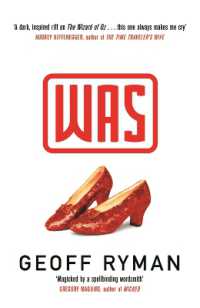Full Description
Can television shows like Stranger Things, popular music by performers like Taylor Swift, advertisements for products like Samuel Adams beer, and films such as The Hunger Games help us understand rhetorical theory and criticism?
The Fourth Edition of The Rhetorical Power of Popular Culture offers students a step-by-step introduction to rhetorical theory and criticism by focusing on the powerful role popular culture plays in persuading us as to what to believe and how to behave. In every chapter, students are introduced to rhetorical theories, presented with current examples from popular culture that relate to the theory, and guided through demonstrations about how to describe, interpret, and evaluate popular culture texts through rhetorical analysis. Authors Deanna Sellnow and Thomas Endres provide sample student essays in every chapter to demonstrate rhetorical criticism in practice. This edition's easy-to-understand approach and range of popular culture examples help students apply rhetorical theory and criticism to their own lives and assigned work.
Contents
Chapter 1. What Is Popular Culture and Why Study It?
What Is Popular Culture?
What Are Popular Culture Texts?
Why Study Popular Culture?
Conducting Rhetorical Analyses of Popular Culture Texts
Chapter 2. Expanding the Rhetorical Tradition
The Nature of Rhetoric and Rhetorical Criticism
Evolution of the Rhetorical Tradition in Western Societies
Conducting a Neo-Aristotelian Analysis
New (Contemporary and Postmodern) Rhetorical Approaches
Chapter 3. A Narrative Perspective
Narrative Paradigm
Elements of Storytelling
Narratives in New Media
Conducting a Narrative Analysis
Chapter 4. A Dramatistic Perspective
The Dramatistic Life Cycle
Cluster Analysis
The Pentad
Conducting a Dramatistic Analysis
Chapter 5. A Symbolic Convergence Perspective
Symbolic Convergence Theory
Fantasy Theme Analysis
Rhetorical Visions and Master Analogues
Life Cycles, Types, and Cues
Conducting a Symbolic Convergence Analysis
Chapter 6. A Neo-Marxist Perspective
Ideology and Hegemony
Materialism and Economic Metaphors
Sites of Struggle
Conducting a Neo-Marxist Analysis
Chapter 7. Feminist Perspectives
Hegemony
Sites of Struggle
Waves of Feminism
Feminist Perspectives
Conducting a Feminist Analysis
Chapter 8. A Music Perspective: The Illusion of Life
Music As Rhetoric
The Illusion of Life: Virtual Time and Virtual Experience
Conducting an Illusion of Life Analysis
Chapter 9. Visual Perspectives
History and Nature of Visual Communication
Visual Theory Perspectives
Visual Pleasure Theory
Conducting a Visual Pleasure Analysis
Chapter 10. Media-Centered Perspectives
Media History and Evolving Insights
Media-Centered Theories
Conducting a Media-Centered Perspective Analysis
Appendix. Writing a Popular Culture Rhetorical Essay








